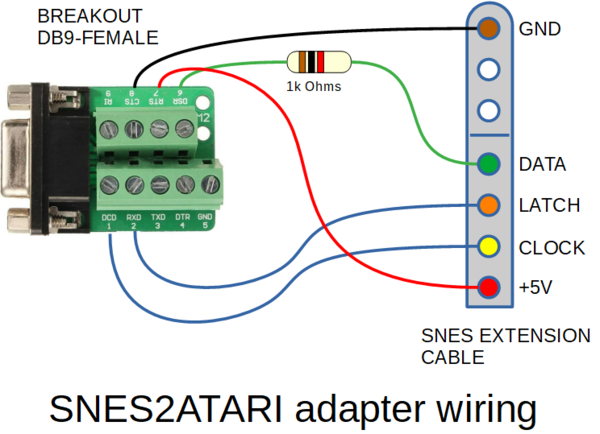Difference between revisions of "SNES2Atari"
| Line 18: | Line 18: | ||
==SNES2Atari Driver== | ==SNES2Atari Driver== | ||
| − | |||
; ___ _ _ ___ ___ _ _ | ; ___ _ _ ___ ___ _ _ | ||
; / __| \| | __/ __| __| |_ _(_)_ _____ _ _ | ; / __| \| | __/ __| __| |_ _(_)_ _____ _ _ | ||
| Line 120: | Line 119: | ||
; | ; | ||
; | ; | ||
| − | ;from Latch down to read first bit: 4+2+2+2+5+5+2 = 22 -> 18.5us | + | ;from Latch down to read first bit: 4+2+2+2+5+5+2 = 22 -> 18.5us |
| − | ;from clock rise to next sample | + | ;from clock rise to next sample: 3+2+5+5+5+[2]+4+2+2 = 30 -> 25.2us |
Revision as of 16:53, 20 November 2022
What is it?
The SNES2Atari is an adapter that allows you to connect an SNES controller to the Atari 7800, 2600, the Atari 8-bit computer line, and likely many other platforms that have a DB9 joystick port and can use Atari joysticks. Games must be specifically coded to use the SNES controller.
The design is quite minimal, and can be implemented with just an SNES extension cable, a 1kΩ resistor, and a serial DB9 breakout connector. Alternatively, a more robust adapter can be implemented with a minimal pcb, an SNES port, a 1kΩ resistor, and a serial DB9 connector.
The SNES2Atari circuit and driver was created AtariAge user Danjovic.
SNES2Atari Adapter Wiring
Note: when the 7800 console has the controller port in two-button mode, 5 volts is directly connected to pin 6. The 1kΩ resistor in the snes2atari serves to protect the snes pad's data output when the console is in this state.
SNES2Atari Driver
; ___ _ _ ___ ___ _ _ ; / __| \| | __/ __| __| |_ _(_)_ _____ _ _ ; \__ \ .` | _|\__ \ / _` | '_| \ V / -_) '_| ; |___/_|\_|___|___/ \__,_|_| |_|\_/\___|_| ; ; SNES controller on port 2 ; V2 - Detect SNES controller ; Connections ; Atari SNES ; +---+ ; VCC (7)-+----------| o | VCC ; UP (1)------------| o | CLOCK ; DOWN (2)------------| o | LATCH ; FIRE (6)----vvvv----| o | DATA ; 1k Ohm +---+ ; | o | ; | o | ; GND (8)-+----------| o | GND ; '._. ; LEFT (3)- n.c. ; RIGHT (4)- n.c. ; POT1 (5)- n.c. ; POT2 (9)- n.c. ; ; initialize port 2 and detect controller ; return zero flag activated if controller detected INITPORT2: lda SWCHB ora #$10 sta SWCHB ; PB4 High->DISABLE transistor Q5, enabling single button joystick lda #$03 ; 2 sta CTLSWA ; 5 enable pins UP/DOWN to work as outputs sta SWCHA ; 5 make pins clock (UP) and latch (DOWN) to go high rts ; 6 ; detect controller ; return carry set if fail DETECT: jsr SAMPLESNES bcs END_DETECT lda LowDataByte ; bits 16 15 14 13 12 11 10 09 ora #$0f ; bits 16 15 14 13 Hi Hi Hi Hi all Hi's for SNES controller eor #$ff ; shall be all Low's for SNES controller beq END_DETECT sec ; set carry to indicate no controller detected END_DETECT: rts ; sample controller on port 2 ; assume port already initialized ; At the end: 7 6 5 4 3 2 1 0 ; LowDataByte: 1 1 1 1 RSH LSH X A ; HighDataByte: RIGHT LEFT DOWN UP START SELECT Y B ; Carry Flag is the 17th bit ; SAMPLESNES: ; 6 (from jsr) lda #$0 ; 2 clock down, latch down sta SWCHA ; 4 make both latch and clock down ldx #$01 ; 2 clock up, latch down ldy #16 ; 2 16 bits lda #$ff ; 2 Initialize with no button pressed sta LowDataByte ; 5 if necessary to gain a few microseconds sta HighDataByte ; 5 from latch/clk down till first bit sample lda #$0 ; 2 SMPSN0: lda INPT5 ; 3 sample data rol ; 2 stx SWCHA ; 5 clock up ror LowDataByte ; 5 take some time ror HighDataByte ; 5 shifting controller data lda #$0 ; 2 and reloading accumulator sta SWCHA ; 4 clock down dey ; 2 next bit bne SMPSN0 ; 2 repeat stx SWCHA ; 5 clock up, next edge to read 17th bit lda INPT5 ; 3 rol ; 2 sample data, 17th bit on Carry lda #$03 ; 2 both clock and latch up sta SWCHA ; 5 finish sampling rts ; 6 ; Total time take for sample, from jsr SAMPLE till return: ; 6+2+4+2+2+2+5+5+2 + 16* ([3+2]+5+5+5+[2]+4+2+2) + 5+[3+2]+2+5+6 ; 30 + 16* (28+[2]) + 23 ; 30 + 480 + 23 = 533 cycles =~447us at 1.19MHz ;clocks: ;____ ____ ____ ____ ___ ; \_______s__/ \___s__/ \___s__/ \___s.... ;____ ; \4222552s32/5552\422s32/5552\422s32/5552\422s.... ; ; ;from Latch down to read first bit: 4+2+2+2+5+5+2 = 22 -> 18.5us ;from clock rise to next sample: 3+2+5+5+5+[2]+4+2+2 = 30 -> 25.2us
Authorship
The SNES2Atari circuit design and adapter was written by AtariAge user Danjovic. All code and circuit design was kindly provided by him under the "no rights reserved" CC0 license.
